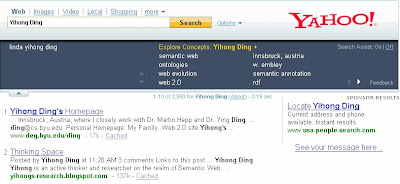Yahoo updated its search
Believe or not, I like Yahoo though many of my discussions about Yahoo are negative so far. It was because of Yahoo that I were able to learn Unite States. I still remember those old days when I explored the Yahoo list of US universities and how much exciting I was. I do love Yahoo.
But I do blame Yahoo a lot too. Yahoo has been just stayed where it was for long time. The Yahoo site is still popular. But the reputation of Yahoo search is ruined indefinitely. I blog about and blame Yahoo because in personal feeling I still love it, though I am now using Google as my default search engine.
My Experiences on New Yahoo! Search
It has been long time not hearing Yahoo search declaring exciting news of its creation. Finally, it seems we got one. Yahoo updates it search engine and brings us some new hope for this classic site. 
By typing in my name "Yihong Ding", I got several suggestion of related concepts about this search request. Fortunately (or unfortunately), all of the Yahoo suggested keywords are actually about me. (Sorry, the other "Yihong Ding"s.) For instance, "semantic web", "ontologies", "web evolution", and "Web 2.0". Bingo! All of them are in my expertise areas.
Moreover, Yahoo also suggested "innsbruck, austria". Good enough, this is where I did my internship last summer. The next one is "w. embley", who is my PhD advisor. Weird! Where does his first name go? The rest ones are "semantic annotation" and "rdf". All of them are indeed related to me. Done!
Am I satisfied? Sure, indeed. But how about the other "Yihong Ding"s (not me), are they satisfied? Probably not. Very likely they, if any, will drop off Yahoo for another search engine immediately.
So the problem is that this suggested set is heavily biased. They are only about one particular "Yihong Ding" but not the others. This is an intrinsic problem of the current semantic understanding technologies.
If the semantic technology would succeed at the end, it must overcome the winner-take-all problem. In this world, the general public are unpopular ones and they do not want to see that their existence has been overlooked.
Discussion
To me, the really inspiring contribution this new Yahoo search brings is the philosophy beneath these keyword suggestions, i.e. the idea of "search assist". Presented by Yahoo researchers, search assist is an attempt of changing from what to do to what have done. By leveraging the search history collected by Yahoo servers, Yahoo tries to provide as many suggestions as possible to help users rapidly get their search assignment done. This is definitely a positive progress.
A curious question about this new Yahoo search assist is which direction it is going to pursue. I feel two paths, while one is dangerous and the other is adventurous. The dangerous path is to repeat the fallacy of Yahoo Directory. Eventually, the search assist becomes a tedious human-managed taxonomy. The adventurous path is, however, to upgrade "search assist" to "search assistant". That is, Yahoo should give up the control of search assist. By contrast, Yahoo hands the power of control to individual users and let them hire Yahoo search assistant to search. Yahoo changes its role from a central web search hub to a central search distribution hub. Digital search assistants become Yahoo's employees who work for individual web users.
In summary, new Yahoo Search does bring new hope. Will Yahoo start to go for a new path and avoid being trapped again into the same old problem? We don't know, but I wish Yahoo the best of its future.

No comments:
Post a Comment